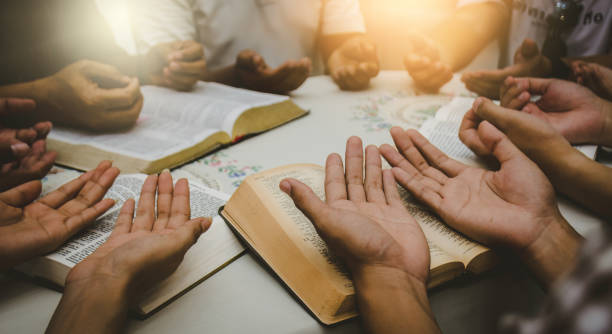
Why 5pm?
The primary reason is that 5pm is the time we believe we were directed to gather by the Lord; but later also realized that it was nearly evening and the day was almost over when the Lord Jesus first broke bread with the disciples in a village on the road to Emmaus, an event through which He purposed for them to know and recognized Him as the Christ who was crucified but now risen from the dead. This time of day also marks the end of the old and the beginning of the new 24-hour biblical day starting with the evening, and being on Sunday which is also theologically referred to as the “8th day” as well as the “Lord’s Day”, it also points ahead to the Day of the Lord and the Eternal Age to come. We believe that God is fulfilling all things and also doing something new! Can you perceive it?
Note: We have begun meeting on a monthly basis, on the 3rd Sunday of each month.
Primary and Secondary Focus
Our focus when gathering is first on our God and Savior in Spirit, Word, and Sacrament, and then second towards each other whom we are called to love as Christ loved us. Therefore, we ask and allow for a balance of respectfulness and friendliness when gathering as the Body of Christ in His Name, and where He is really present.
Worship in God’s Presence
Worship Services combine and unite the various elements of the Apostolic Church birthed on Pentecost, in both a contemporary context and liturgical framework, so that the gathering is Spirit-filled, orderly, biblically edifying, and sacred, which is both pleasing to God and good for man, both believer and guest. Music and songs combine old and new selections and styles, nurturing both joyful and holy praise for multi-generational appreciation and growth. You might hear people praying or singing in the Spirit at times, remain silent, or give a prophetic word. You might see people either exuberantly expressing themselves before God or quietly humbled by His Presence. You might hear a testimony, or a vision, or receive from the Lord through a time of healing prayer, or something else inspiring or amazing, as well as visible symbols of the Kingdom. We instruct on all these various elements so people can learn and grow to worship God in spirit and truth.
The Ministry of the Word
The Holy Scriptures are publicly read and soundly taught as the primary resource of God’s revelation to man. The readings selected are based upon a 3-year lectionary and/or the pastor’s discernment. After the reading will follow a sermon, and sometimes responsive prayer and possibly an “altar call”. While it is not required, everyone is encouraged to bring a personal bible with them to foster learning and appreciation of God’s Word, which unless we remain in, we cannot truly be His disciples.
Intercessory Prayer
A time of corporate and individual prayer after the sermon either before and/or during Holy Communion will occur using a liturgical “Prayers of the People” format and/or spontaneous individual petitions.
Nicene Creed
The Nicene Creed will be read at times as a collective summarized responsorial profession of faith to the reading and hearing of the Word of God. The Apostles Creed would be recited at a baptism.
Holy Communion
All biblically baptized Christians are invited to receive holy communion in the forms of bread and wine which Jesus said are His body and blood, even though some may struggle with comprehension and interpretation of what He said. Those struggling with wine can simply refrain from taking or alternatively take grape juice offered in love. Other aspects of the New Covenant meal, also referred to as the Eucharist or the Lord’s Supper, are discussed on the Beliefs page under the menu. While Holy Communion is a holy meal we are called to participate in and receive individually, it is also understood and respected as a family of God event in which we are gathered together in unity through Christ as members of His Body.
The Great Commission
The gathering time ends with encouragement to go into the world to make disciples of all the nations, preach the Gospel, bear witness, or give a testimony of Jesus, which all should be prepared and ready to do. The “great commission” was the Lord Jesus’ authoritative command to the apostles of the Church, who were “sent” by Him. It was not a request or suggestion, but instead a command in which He promised to work with them and give them power from the Holy Spirit to do so. This is actually what the word “mass” refers to, from the Latin word “missa”, which is the dismissal from the gathering with a charge to go. “Mass” does not really refer to the remembrance of Jesus’ sacrifice, but instead to the call of submission to follow Jesus into the world. The gathering of Christians to God the Father in His Name is only the first part of His inviting call. The second part is to go into the world and bear witness in order to bring others to God through Him. After Jesus celebrated that last Passover Supper Meal and First Eucharist, He then left the place where they had gathered and fulfilled its meaning in personal actuality, with true unconditional love as His primary motivation, and leading by example.
Dynamic Gatherings of the Body Of Christ
What the Church does when it gathers has formed and developed from Jesus’ time through apostolic traditions and historical reformations, with different parts of the Church having some similar but also different variations of expression, practice, and applied theology contained in their worship services. Scripturally, the first reference of the Church’s pentecostal gathering in Acts 2:42 uses the phrases, “the apostle’s teaching and fellowship, the breaking of bread and the prayers, and later 1 Corinthians 14:26 speaks of various contributions from various people as the Spirit leads, including a teaching, revelation, song, tongue, interpretation, et al. for the building up the Body. These two references speak of many elements that most churches today limit to a few, based upon how they historically formed and developed. Our hope is to allow for the Lord to accomplish His design and purpose when we gather in His Name and Presence, and so we pray for ourselves, and for you, to be open to biblical things not yet encountered in past church experiences, and trust in the leading of the Spirit of God in these things, knowing that although there should be biblical order in Church gatherings, that there should also be a freedom and openness to the dynamic work of God in the time of gatherings of the Body of Christ who have also received the Holy Spirit.